Charles E W Bean, Diaries, AWM38 3DRL 606/271/1 - 1917 - 1938 - Part 10
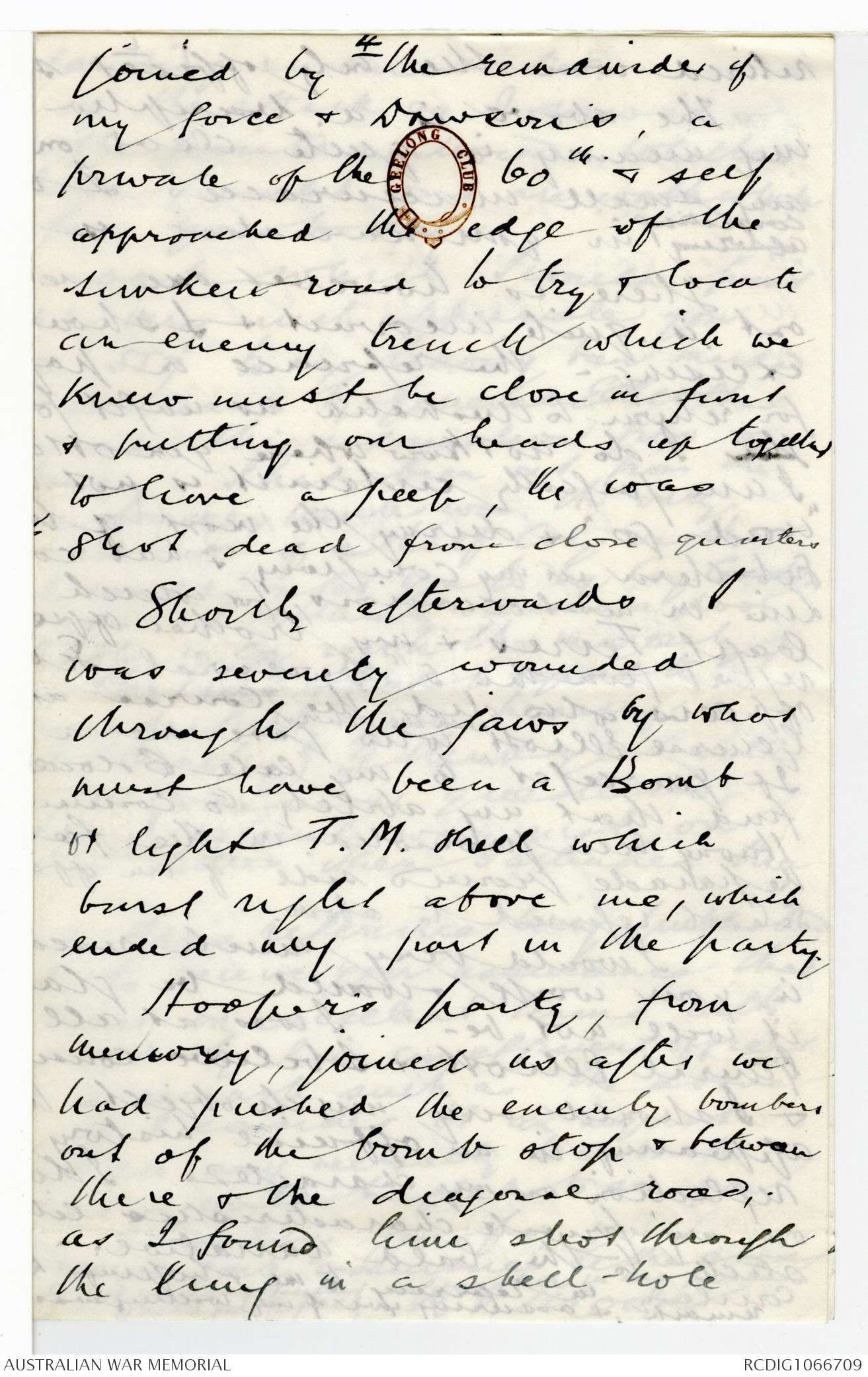
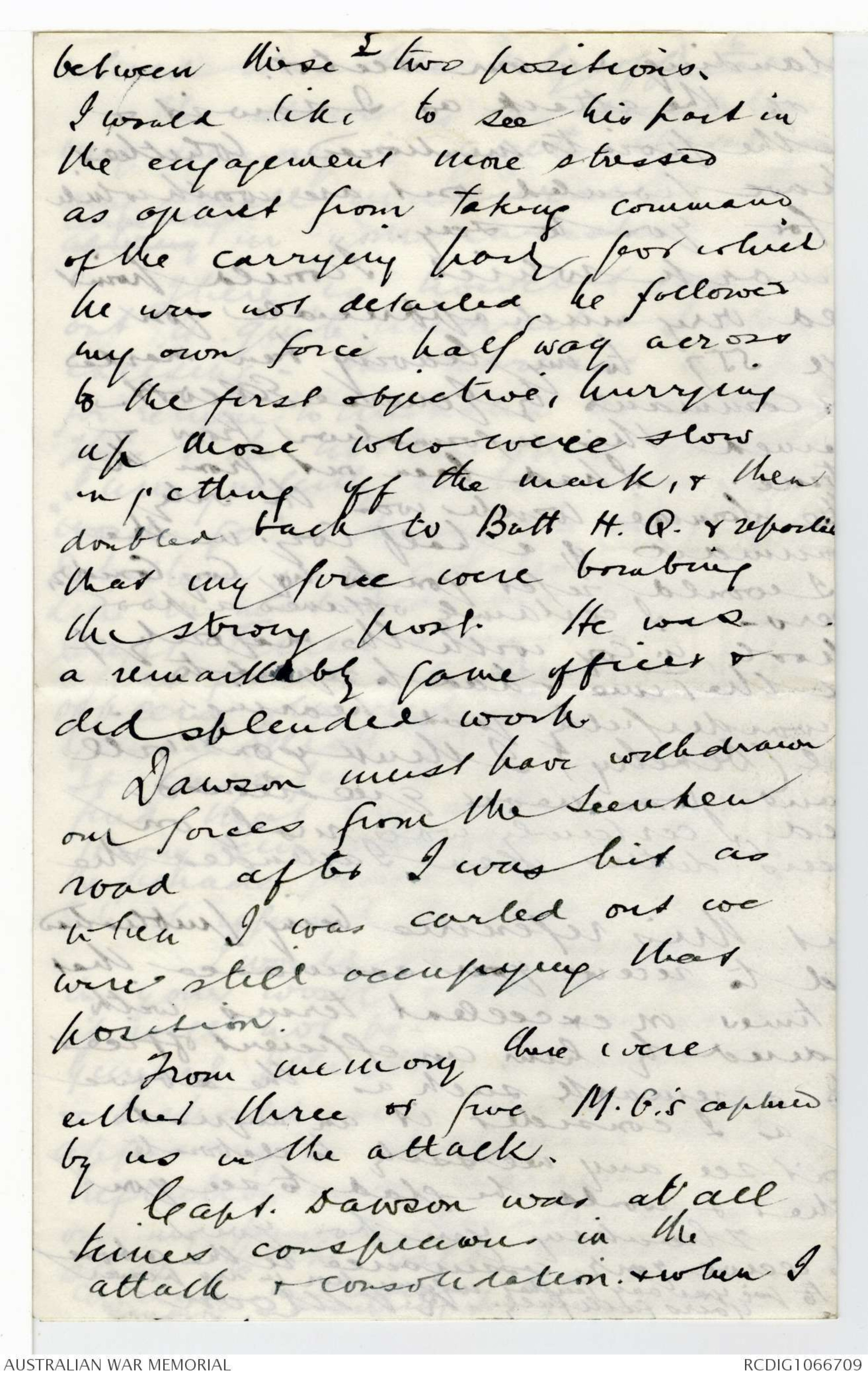
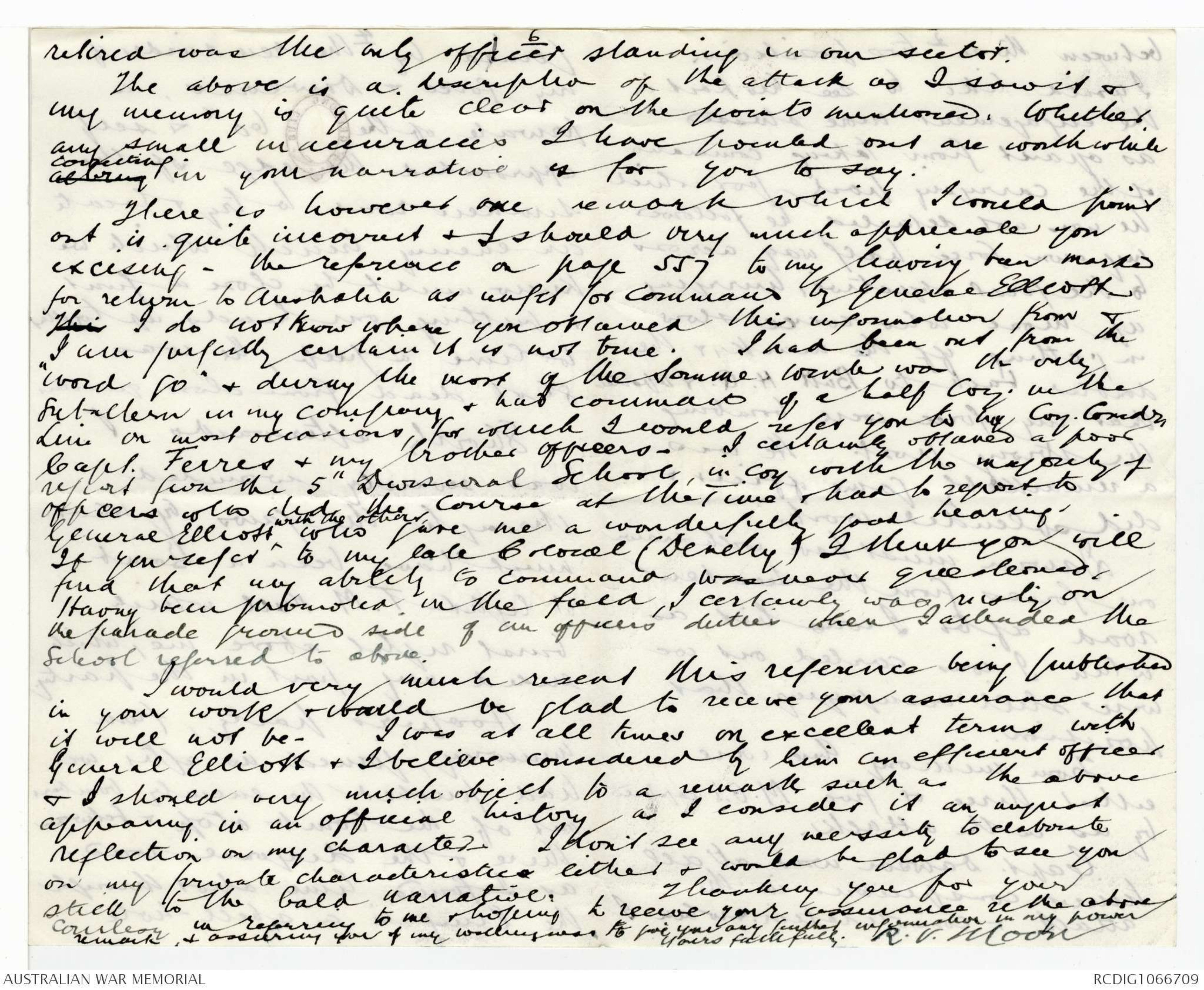
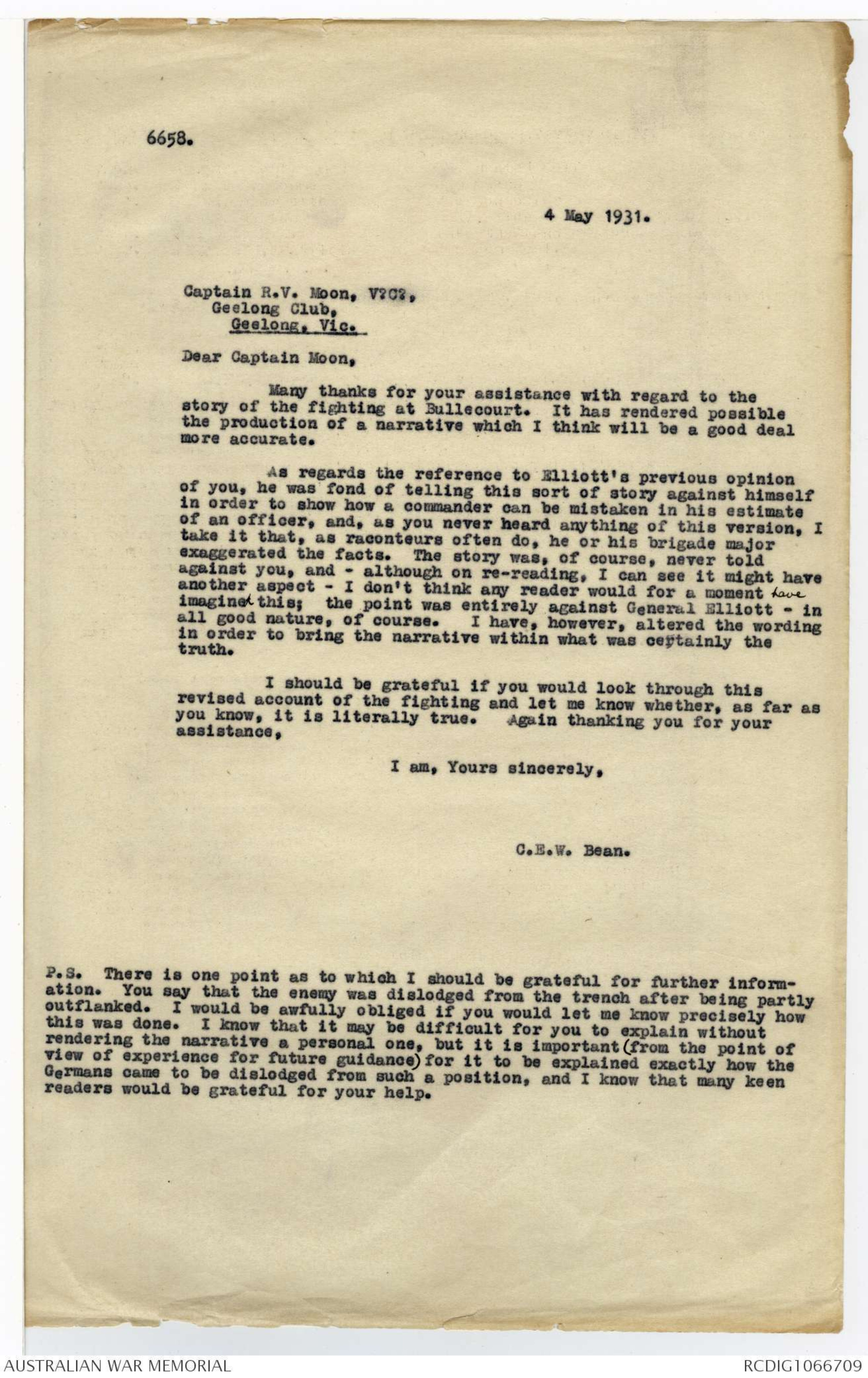
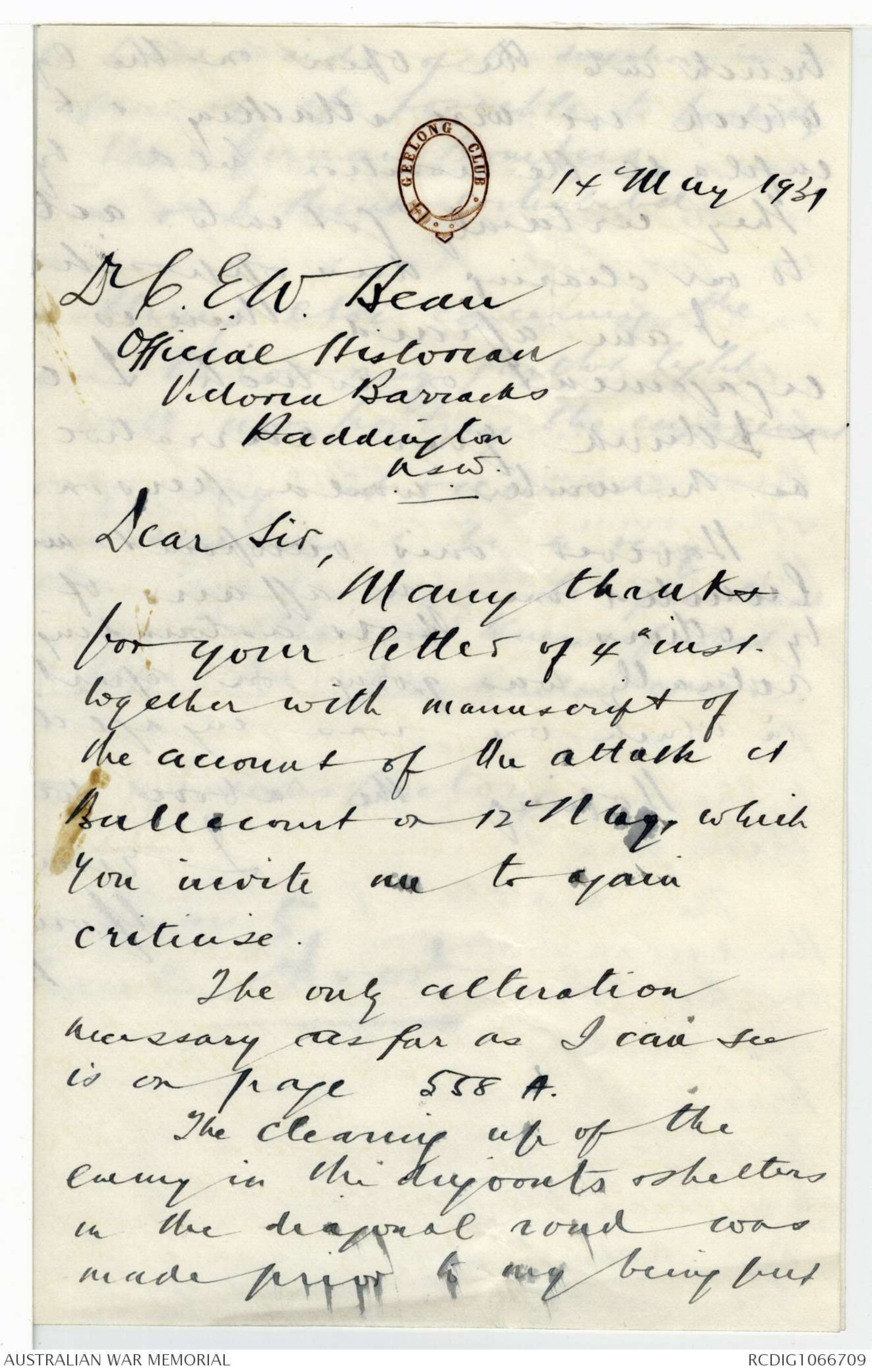
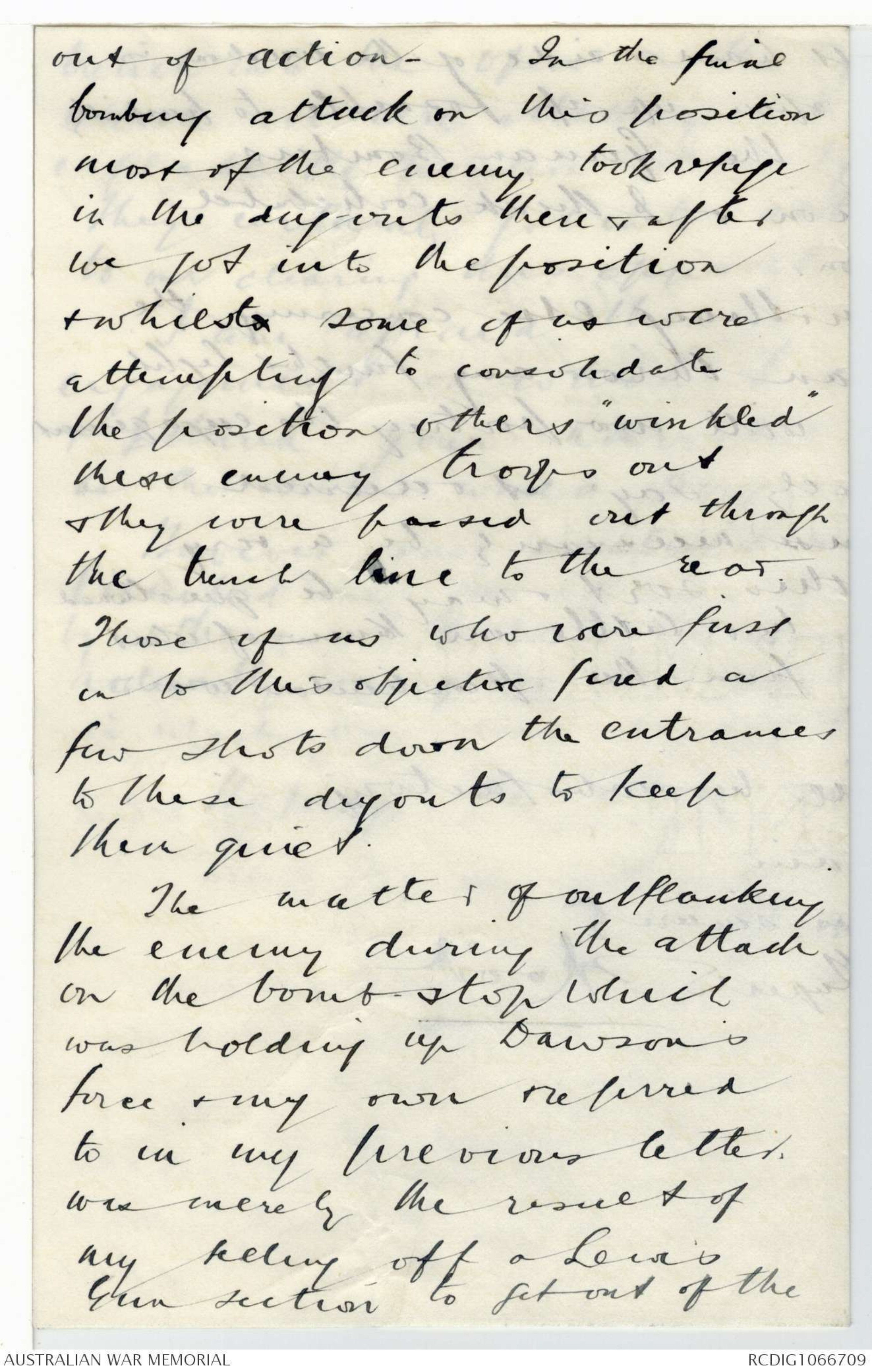
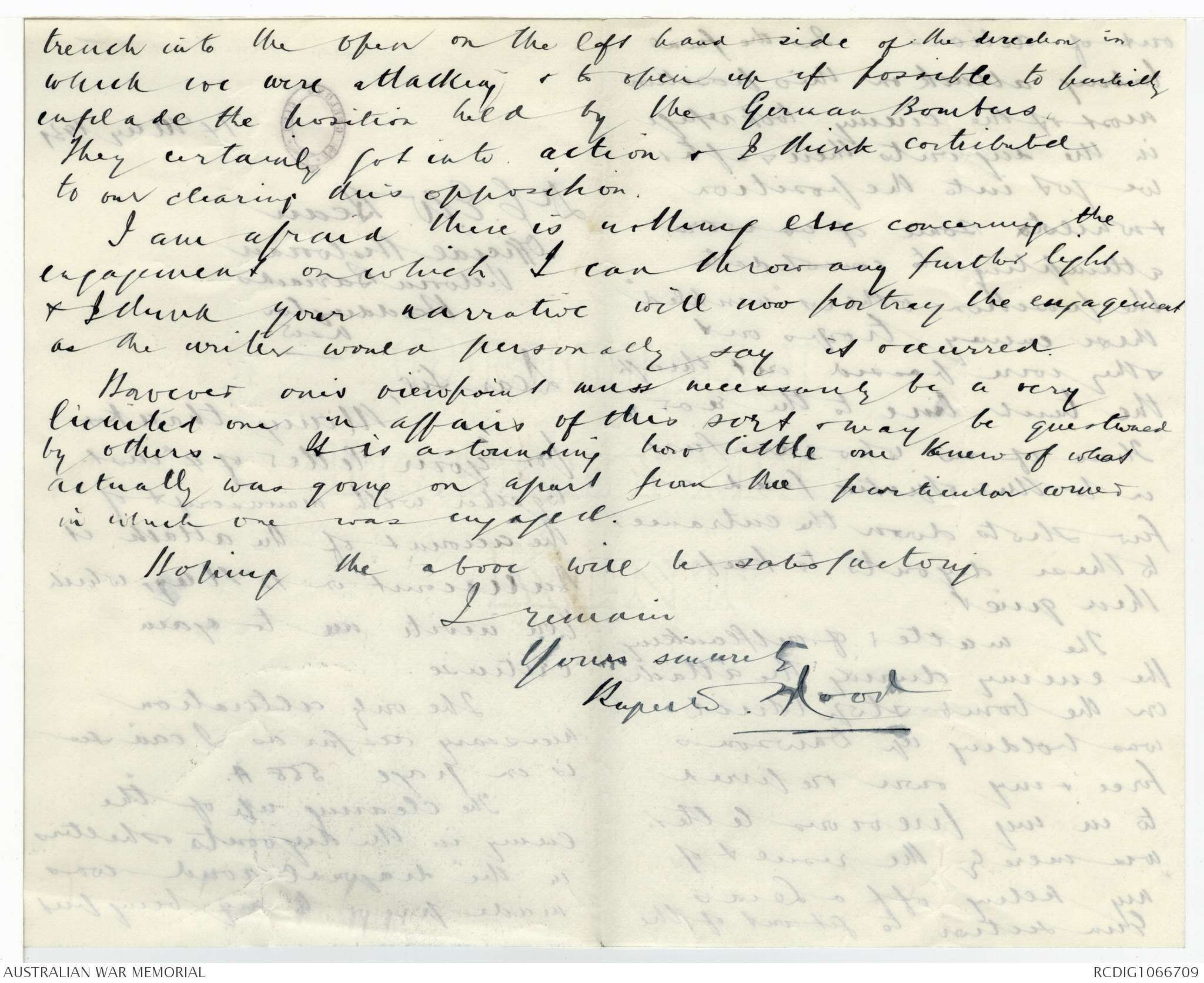
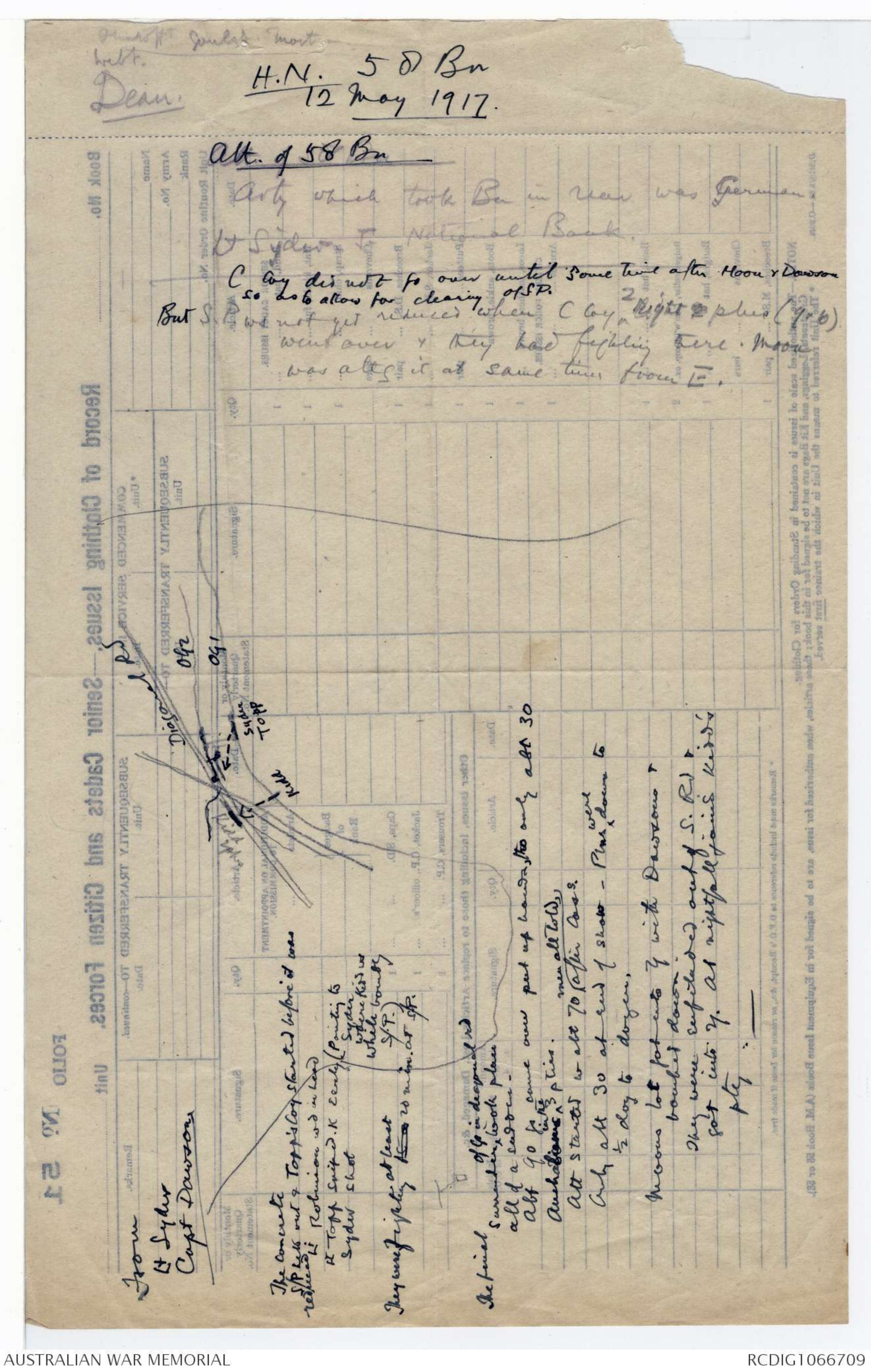
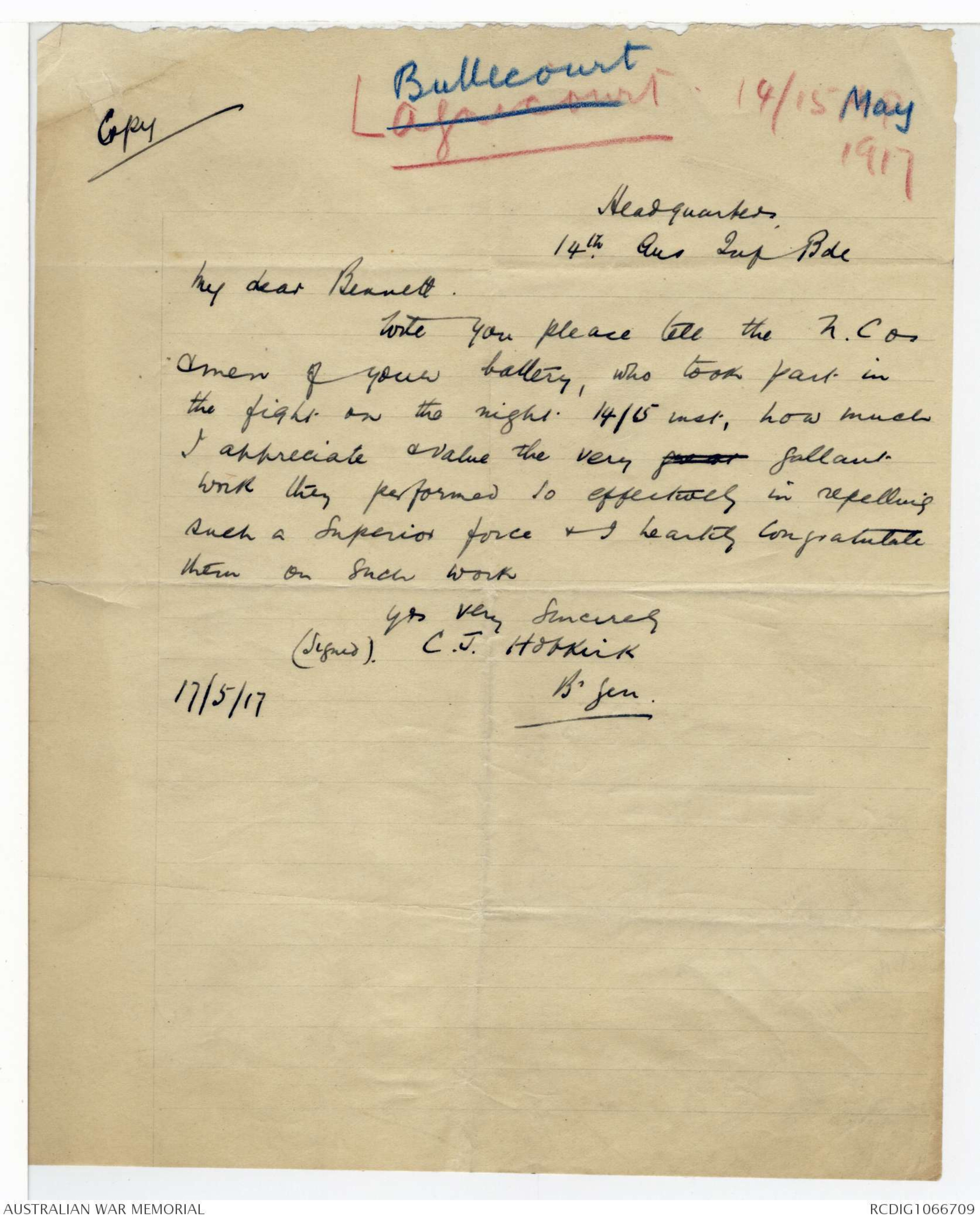
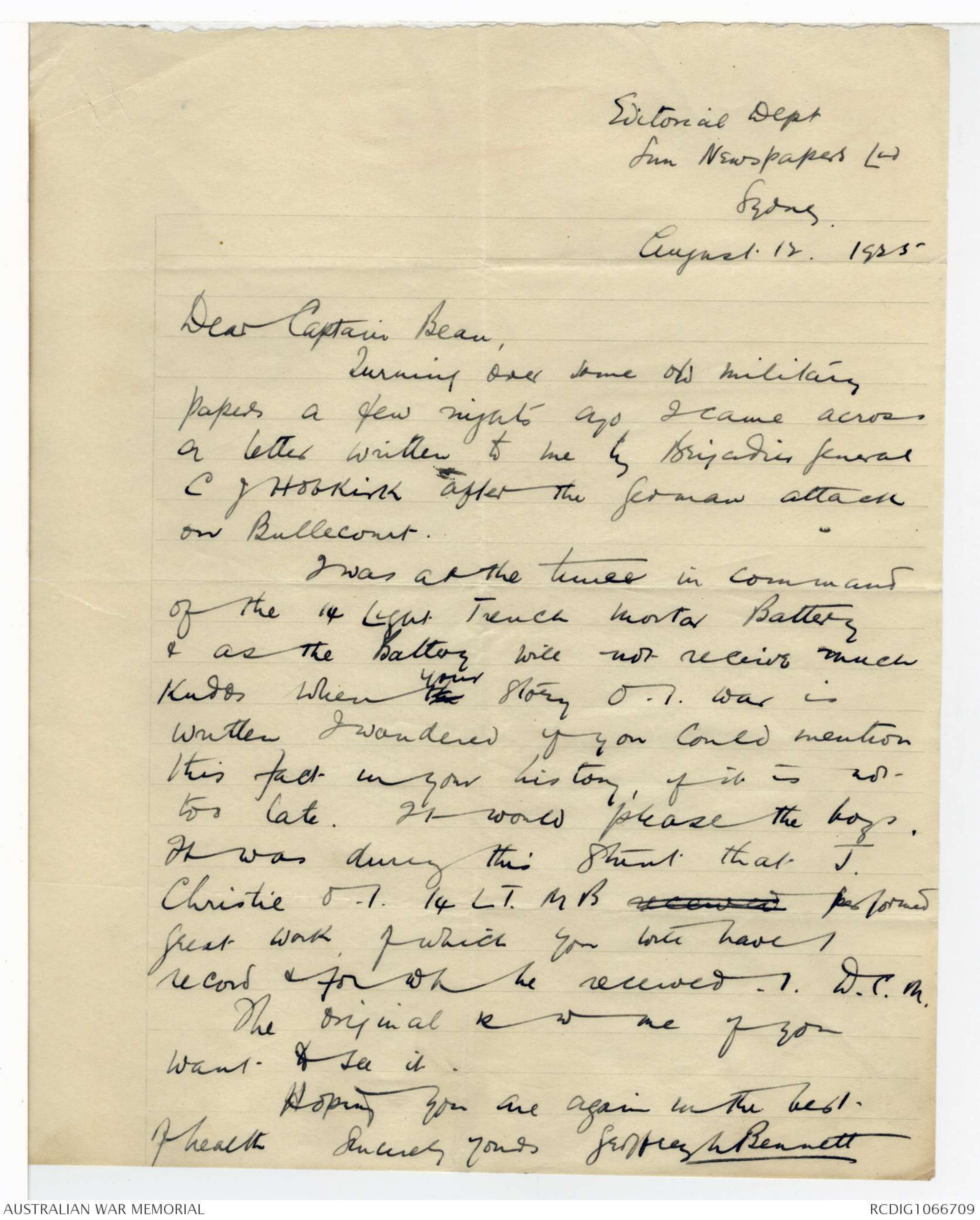
4
Geelong Club
joined by the remainder of
my force & Dawson's, a
private of the 60th & self
approached the edge of the
sunken road to try & locate
an enemy trench which we
knew must be close in front
& putting our heads up together
to have a peep, he was
shot dead from close quarters
Shortly afterwards I
was severey wounded
through the jaws by what
must have been a Bomb
or light T.M. shell which
burst right above me, which
ended my part in the party.
Hooper's party, from
memory, joined us after we
had pushed the enemy bombers
out of the bomb stop & between
there & the diagonal road
as I found him shot through
the lung in a shell-hole
5
between these two positions.
I would like to see his part in
the engagement more stressed
as apart from taking command
of the carrying party for which
he was not detailed he followed
my own force half way across
to the first objective, hurrying
up those who were slow
in getting off the mark, & then
doubled back to Batt H.Q. & reported
that my force were bombing
the strong post. He was
a remarkably game officer &
did splendid work
Dawson must have withdraw
our forces from the [Seeuhen?]
road after I was hit as
when I was carried out we
were still occupying that
position.
From memory, there were
either three or five M.G.s captured
by us in the attack.
Capt. Dawson was at all
times conspicuous in the
attack & consolidation & when I
6
retired was the only officer standing in our sector.
The above is a description of the attack as I saw it &
my memory is quite clear on the points mentioned. Whether
any small inaccuracies I have pointed out are worthwhilealtering correcting in your narrative is for you to say.
There is however one remark which I would point
out is quite incorrect & I should very much appreciate you
excising - the reference or page 557 to my having been marked
for return to Australia as unfit for command by General Elliott.This I do not know where you obtained this information from &
I am perfectly certain it is not true. I had been out from the
word go & during the worst of the Somme winter war the only
subaltern in my company & had command of a half Coy. in the
line on most occasions, for which I could refer you to my Coy. Comdr
Capt Ferres & my brother officers- I certainly obtained a poor
report from the 5th Divisional School, in coy with the majority of
officers who did course at the time & had to report to
General Elliott ^with the others, who gave me a wonderfully good hearing.
If you refer to my late Colonel (Denehy) I think you will
find that my ability to command was never questioned.
Having been promoted in the field, I certainly was rusty on
the parade ground side of an officer's duties when I attended the
School referred to above.
I would very much resent this reference being published
in your work & would be glad to receive your assurance that
it will not be- I was at all times on excellent terms with
General Elliott & I believe considered by him an efficient officer
& I should very much object to a remark such as the above
appearing in an official history as I consider it an unjust
reflection on my character. I don't see any necessity to elaborate
on my private characteristics either & would be glad to see you
stick to the bald narrative.
Thanking you for your
courtesy in referring to me & hoping to receive your assurances re the above
remark, & assuring you of my willingness to give you any further information in my power.
Yours faithfully
R.V. Moon
6658.
4 May 1931.
Captain R.V. Moon, V?C?
Geelong Club,
Geelong. Vic.
Dear Captain Moon,
Many thanks for your assistance with regard to the
story of the fighting at Bullecourt. It has rendered possible
the production of a narrative which I think will be a good deal
more accurate.
As regards the reference to Elliott's previous opinion
of you, he was fond of telling this sort of story against himself
in order to show how a commander can be mistaken in his estimate
of an officer, and, as you never heard anything of this version, 1
take it that, as raconteurs often do, he or his brigade major
exaggerated the facts. The story was, of course, never told
against you, and - although on re-reading, I can see it might have
another aspect - I don't think any reader would for a moment have
imagined this; the point was entirely against General Elliott - in
all good nature, of course. I have, however, altered the wording
in order to bring the narrative within what was certainly the
truth.
I should be grateful if you would look through this
revised account of the fighting and let me know whether, as far as
you know, it is literally true. Again thanking you for your
assistance,
I am, Yours sincerely,
C.E.W. Bean.
P.S. There is one point as to which I should be grateful for further information.
You say that the enemy was dislodged from the trench after being partly
outflanked. I would be awfully obliged if you would let me know precisely how
this was done. I know that it may be difficult for you to explain without
rendering the narrative a personal one, but it is important (from the point of
view of experience for future guidance) for it to be explained exactly how the
Germans came to be dislodged from such a position, and I know that many keen
readers would be grateful for your help.
Geelong Club.
14 May 1939
Dr C.E.W. Bean
Official Historian
Victoria Barracks
Paddington
N.S.W
Dear Sir
Many thanks
for your letter of 4th inst.
together with manuscript of
the account of the attack at
Bullecourt on 12 May which
you invite me to again
criticise.
The only alteration
necessary as far as I can see
is on page 558 A.
The clearing up of the
enemy in the dugouts & shelters
in the diagonal road was
made prior to my being put
out of action- In the final
bombing attack on this position
most of the enemy took refuge
in the dug-outs there & after
we got into the position
& whilsta some of us were
attempting to consolidate
the position others "winkled"
these enemy troops out
& they were passed out through
the trench line to the rear.
Those if us who were first
in to this objective fired a
few shots down the entrances
to these dugouts to keep
them quiet.
The matter of outflanking
the enemy during the attack
on the bomb stop which
was holding up Dawsons
force & my own referred
to in my previous letter.
was merely the result of
my telling off a Lewis
Gun section to get out of the
trench into the open on the left hand side of the direction in
which we were attacking & to open up if possible to partially
enfilade the position held by the German Bombers.
They certainly got into action & I think contributed
to our clearing this opposition.
I am afraid there is nothing else concerning the
engagement on which I can throw any further light
& I think your narrative will now portray the engagement
as the writer would personally say it occurred.
However ones viewpoint must necessarily be a very
limited one in affairs of this sort & may be questioned
by others. It is astounding how little one knew of what
actually was going on apart from the particular corner
in which one was engaged.
Hoping the above will be satisfactory
I remain
Yours sincerely
Rupert Moon.
H.N 58 Bn
12 May 1917
Alt. of 58 Bn
Arty which took Bn in rear was German.
Lt Syder to National Bank
C Coy did not go over until some time after Moon & Dawson
so as to allow for clearing of S.P.
But S.P. ws not yet reduced when C Coy, 2 right 2 plns (9 & 6)
went over & they had fighting there. Moon
was attg. it at the same time from E.
Diagram - see original document
[*Agricourt Bullecourt
14/15 May
1917*]
Copy
Headquarter
14th Aus Inf Bde
My dear Bennett.
Will you please tell the N.Cos
& men of your battery, who took part in
the fight on the night. 14/15 inst, how much
I appreciate & value the very great gallant
work they performed so effectively in repelling
such a superior force & I heartily congratulate
them on such work
yrs very sincerely
(Signed). C.J. Hobkirk
Br Gen.
17/5/17
Editorial Dept
Sun Newspapers Ltd
Sydney
August 12. 1925
Dear Captain Bean
Turning over some old military
papers a few nights ago I came across
a letter written to me by Brigadier General
C J Hobkirk after the German attack
on Bullecourt.
I was at the time in command
of the 44 Light Trench Mortar Battery
& as the Battery will not receive much
kudos when the your story o. /. war is
written I wondered if you could mention
this fact in your history if it is not
too late. It would please the boys.
It was during this stunt that J.
Christie o. /. 14 LT, MB received performed
great work, of which you will have /
record & for wh he received. /. D.C.M.
The original is w me if you
want to see it.
Hoping you are again in the best
of health
Sincerely yours
Geoffrey W Bennett
 Sam scott
Sam scottThis transcription item is now locked to you for editing. To release the lock either Save your changes or Cancel.
This lock will be automatically released after 60 minutes of inactivity.